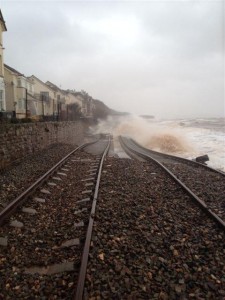
Trainline at Dawlish, Wednesday morning
Mr Ben Bradshaw (Exeter) (Lab):The loss of the railway line at Dawlish in the overnight storms is a devastating blow to the economies of Devon and Cornwall. It comes just a year after we lost our railway service for a whole month because of flooding. Does the Prime Minister accept that we, as a country, will have to spend a great deal more investing in the resilience of our transport infrastructure and that we need a Government who are united in their acceptance of, and their determination to do something about, climate change?
The Prime Minister:I agree wholeheartedly with the right hon. Gentleman on a number of points. First, we need to ensure that urgent action is taken to restore the transport links and that is why I will chair Cobra this afternoon, bringing together the problems of the power reductions, the floods and the effect on transport. Secondly, we must ensure that we go on investing in rail schemes and this Government are putting record amounts into such rail schemes. The third point, on which I totally agree with him, is that we need to continue the analysis of the resilience of our infrastructure that is now carried out by the Cabinet Office. Where extra investment and protections are needed, they must be put in place….
Anne Marie Morris (Newton Abbot) (Con):No doubt the Prime Minister saw the scenes of destruction resulting from storm damage in Dawlish in my constituency. Our railway line is out of action, 25 families have been evacuated and one house is about to fall into the sea. Devon and Cornwall feel cut off. Can he confirm that he is taking all the action possible to get transport systems back in action and families back into their homes and, crucially, that he will look at fast-tracking a review of the funding for a breakwater to protect the railway line and residents, which currently cannot be implemented until 2019 because of lack of funding?
The Prime Minister:I am very happy to look at all the suggestions my hon. Friend makes. That is why we are holding the meeting of Cobra this afternoon. Members right across the House will know that that railway line is not only a vital artery for the south-west, but one of the most scenic and beautiful lines anywhere in our country, so what has happened is hugely upsetting and disturbing. We will look at all the options, and we will do so with great urgency….

This damage at Dawlish really IS an example of ‘roosting chickens’ – or if you prefer, putting all your eggs in one basket.
In the 1960s a minor route, bypassing Dawlish and Teignmouth and linking Exeter and Newton Abbot, was closed .
More importantly, so was the former LSWR/Southern Railway mainline route from Exeter to Plymouth round the ‘top’of Dartmoor, via. Oakhampton and Tavistock.
Only one route to the west was deemed necessary ,and at a time of ‘economy’ and of the assumed long term decline forecast for the railways, it was inevitable that it would be the former GWR line that would remain, and that the former Southern Railway route , now under the control of B.R. Western Region, would close.
In fact part of this “Withered Arm” did remain, to serve a valuable stone quarry -and in recent summers as a tourist line -but the central section was dismantled.
While Tavistock is now lobbying and anxious to be reconnected with Plymouth by way of the remains of the route at the other end, it will be interesting to see if the reconstruction of the entire Exeter-Oakhampton-Tavistock Plymouth route will receive serious consideration as a long term protection as the coastal route becomes ever more difficult to maintain.If so, what would be the likely costs of reopening- and how would these costs compare with the money “saved” by discarding and largely destroying the line all those years ago.
Of course, all these 60s cutbacks took place at roughly the same time as other ‘duplicate routes’ were being closed; some of the secondary through routes to the south coast in Sussex and Hampshire ,for example,and not least ‘nobody’s baby’ the Great Central, which in part ran parellel to the projected HS2 and which many would prefer to see rebuilt rather than the new line,
And we mustn’t forget that the much praised Chiltern Mainline very nearly went the same way as the GCR, being slated for closure as a through route.